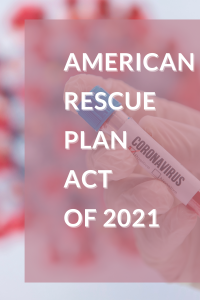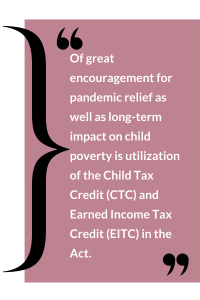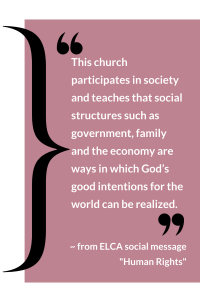 Passage of the American Rescue Plan Act of 2021, signed by President Biden on March 12, was shaped by input of many constituents, including Lutheran voices. Thank you for your advocacy! There is reason to celebrate the recent, significant supports funded for millions of Americans still struggling from the COVID-19 pandemic. The federal response to the crisis of the pandemic is not only colossal, it is personal: a family has rent for another month, food on the table, required medicine, and in many cases even tools to no longer live in poverty and hunger.
Passage of the American Rescue Plan Act of 2021, signed by President Biden on March 12, was shaped by input of many constituents, including Lutheran voices. Thank you for your advocacy! There is reason to celebrate the recent, significant supports funded for millions of Americans still struggling from the COVID-19 pandemic. The federal response to the crisis of the pandemic is not only colossal, it is personal: a family has rent for another month, food on the table, required medicine, and in many cases even tools to no longer live in poverty and hunger.
ELCA federal priorities for advocacy action were emphasized through many individual, leadership and coalition actions. Elements in resulting legislation of critical issues emphasized in our advocacy for a stronger and more equitable recovery are briefly shared in this post, recognizing that a piece of legislation this substantial cannot be easily summarized. The ELCA Program Director for Domestic Policy points to an article by Houston Public Media for a more expanded look at “Here’s What’s In The American Rescue Plan.”
DOMESTIC
Provisions through the American Rescue Plan respond to the national and international health and humanitarian crisis as well as devastating economic realities in every community and family—urban, rural, and tribal—across the country.
One of the most direct supports are payments of up to $1,400 per person and $2,800 for a married couple if their income is below $75,000 or $150,000 respectively per year. Each child or dependent also qualifies for a $1,400 payment.
Some $55 billion will go to COVID-19 vaccine funding and continued contact tracing to fully arrest the virus.
The Special Supplemental Nutrition Program for Women, Infants, and Children (WIC) received $3 billion to invest in WIC’s quality nutrition services to improve health outcomes for pregnant and postpartum women, infants and children under age five. This is critical during COVID-19 because so many healthcare services have been suspended or interrupted during the pandemic. The law also supports low-income seniors with $1.4 billion in funding for Older Americans Act programs like nutrition programs, community-based support programs and the National Family Caregiver Support Program. Additionally, there is $37 million for the Commodity Supplemental Food Program for low-income seniors.
 Of great encouragement for pandemic relief as well as long-term impact on child poverty is utilization of the Child Tax Credit (CTC) and Earned Income Tax Credit (EITC) in the Act. “While public safety net programs such as the Supplemental Nutrition Assistance Program (SNAP) or Temporary Assistance for Needy Families (TANF) often get more attention, refundable tax credits actually have a larger positive impact on poverty,” wrote Ryan Cummings of ELCA World Hunger in a recent post to the ELCA advocacy blog. The CTC, for example, was extended to $3,600 per child age six and under and $3,000 per child age six through 18. Practically, this means for example that a working mother with two children ages eight and five would receive $550 per month through the end of this year while the temporary benefit is active. Those dollars could be used to help pay for childcare, food or clothing for the kids to return to school. Those dollars are often spent in local communities, including grocery stores and main street businesses, and support workers, local and state taxes bases, and much more.
Of great encouragement for pandemic relief as well as long-term impact on child poverty is utilization of the Child Tax Credit (CTC) and Earned Income Tax Credit (EITC) in the Act. “While public safety net programs such as the Supplemental Nutrition Assistance Program (SNAP) or Temporary Assistance for Needy Families (TANF) often get more attention, refundable tax credits actually have a larger positive impact on poverty,” wrote Ryan Cummings of ELCA World Hunger in a recent post to the ELCA advocacy blog. The CTC, for example, was extended to $3,600 per child age six and under and $3,000 per child age six through 18. Practically, this means for example that a working mother with two children ages eight and five would receive $550 per month through the end of this year while the temporary benefit is active. Those dollars could be used to help pay for childcare, food or clothing for the kids to return to school. Those dollars are often spent in local communities, including grocery stores and main street businesses, and support workers, local and state taxes bases, and much more.
Some $5 billion is dedicated to USDA technical assistance, education, and outreach for socially disadvantaged farmers and ranchers, defined as those who have experienced barriers to service due to racial or ethnic prejudice.
Native American and Alaska Native tribal governments will see about $31 billion in support for their communities which have had historically poor health outcomes and have been particularly hit hard by the spread of the virus.
School systems throughout the nation are now eligible for $128 billion in grants to respond to new protocols in classrooms and making education settings safe.
Small businesses now have newly targeted access to the Paycheck Protection Program (PPP) that helps small businesses keep their doors open and their employees paid while many jurisdictions are shuttered. Those who are unemployed can now receive extended Unemployment Insurance payments of $300 per month.
ENVIRONMENT, ENERGY AND INFRASTRUCTURE
The American Rescue Plan addresses home energy by providing $4.5 billion for the Low-Income Home Energy Assistance Program (LiHEAP) and another $500 million for drinking water and wastewater assistance. It also provides $650 million for the Cybersecurity and Infrastructure Security Agency (CISA). The CISA is heading the investigation into the fourth quarter 2020 cyberattack against the company (SolarWind Corp) that hosts servers for the U.S. government and many large companies.
HOUSING
 The final version of the American Rescue Plan contained roughly $50 billion in total in response to comprehensive housing needs stemming from the impact of the pandemic. The infusion includes $10 billion for homeowners facing foreclosure and $27 billion for renters facing eviction – very close to the $30 billion figure we advocated for based upon analysis advanced by the National Low Income Housing Coalition and the Interreligious Working Groupon Domestic Human Needs. Additional funding for homeless grants, tribal housing and fair housing counseling were included for comprehensive needs.
The final version of the American Rescue Plan contained roughly $50 billion in total in response to comprehensive housing needs stemming from the impact of the pandemic. The infusion includes $10 billion for homeowners facing foreclosure and $27 billion for renters facing eviction – very close to the $30 billion figure we advocated for based upon analysis advanced by the National Low Income Housing Coalition and the Interreligious Working Groupon Domestic Human Needs. Additional funding for homeless grants, tribal housing and fair housing counseling were included for comprehensive needs.
This federal investment will proactively prevent the looming mass-eviction crisis and potential second housing crisis that were seething since the start of the pandemic. It is a significant win for congregations and shelters already exceeding capacity – working around the clock to help those of us struggling with homelessness and housing insecurity. The final plan also prioritizes families with the lowest incomes and our siblings who have been impacted by this pandemic the most – marking a step forward in our efforts to address the increasing economic disparities in our communities this past year.
INTERNATIONAL
Congress included nearly $11 billion for international COVID-19 relief. In this amount are funds to help low- and middle-income countries mitigate further spread of the coronavirus in their communities, as well as support them in addressing health, humanitarian and economic needs. While the final bill did not include the $20 billion for which we and coalition partners advocated, this is a step in the right direction. Effective global response to the COVID-19 pandemic requires an enormous amount of resources to which the U.S. and other countries must contribute, and we are grateful to Congress and the president for heeding calls from advocates like yourself to ensure we do not forget our global neighbors.
MIGRATION
Millions of families turned to emergency assistance to put food on the tables and pay for essentials to weather this pandemic, but many mixed-status families received insufficient or no help at all. (A “mixed-status family” is a family whose members include people with different citizenship or immigration statuses, for example in which the parents are undocumented and the children are U.S.-born citizens.) The COVID relief package includes $1,400 in economic impact payments for any qualified adult with a work-valid social security number. Child and adult dependents with a social security number will also be eligible even if their parents are not—meaning that more mixed-status families will receive help where they did not before. The American Rescue Plan’s $7.6 billion in funding for community health centers will go far in promoting equity in access to vaccines and associated services for historically underserved groups, among these farmworkers, and complement the federal government’s vaccine distribution programs to reach these disparately impacted communities. The package also includes $500 million for migration and refugee assistance, along with $110 million in additional Federal Emergency Management Agency (FEMA) funding to help respond to families and individuals encountered by the Department of Homeland Security.
